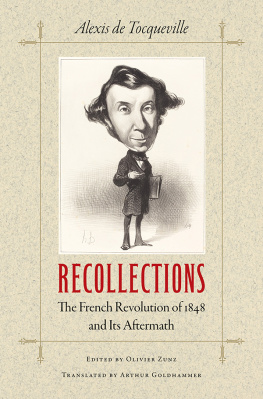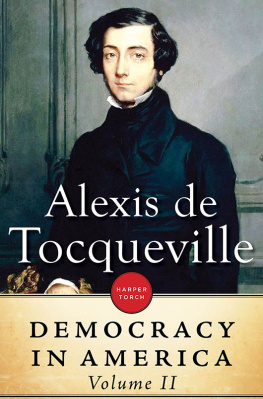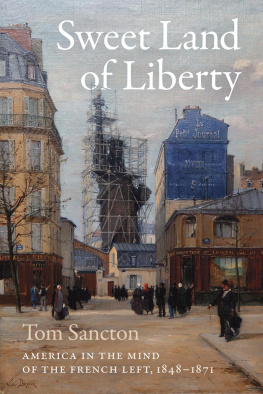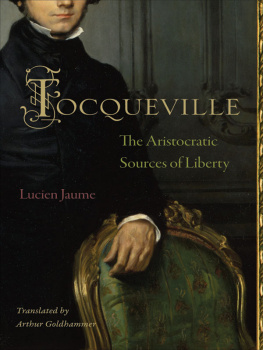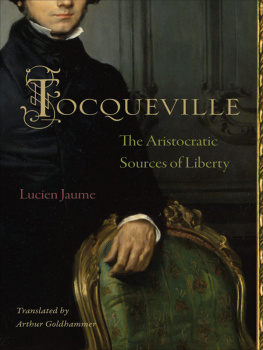Alexis de Tocqueville - Recollections: The French Revolution of 1848 and Its Aftermath
Here you can read online Alexis de Tocqueville - Recollections: The French Revolution of 1848 and Its Aftermath full text of the book (entire story) in english for free. Download pdf and epub, get meaning, cover and reviews about this ebook. year: 2016, publisher: University of Virginia Press, genre: Politics. Description of the work, (preface) as well as reviews are available. Best literature library LitArk.com created for fans of good reading and offers a wide selection of genres:
Romance novel
Science fiction
Adventure
Detective
Science
History
Home and family
Prose
Art
Politics
Computer
Non-fiction
Religion
Business
Children
Humor
Choose a favorite category and find really read worthwhile books. Enjoy immersion in the world of imagination, feel the emotions of the characters or learn something new for yourself, make an fascinating discovery.
- Book:Recollections: The French Revolution of 1848 and Its Aftermath
- Author:
- Publisher:University of Virginia Press
- Genre:
- Year:2016
- Rating:3 / 5
- Favourites:Add to favourites
- Your mark:
- 60
- 1
- 2
- 3
- 4
- 5
Recollections: The French Revolution of 1848 and Its Aftermath: summary, description and annotation
We offer to read an annotation, description, summary or preface (depends on what the author of the book "Recollections: The French Revolution of 1848 and Its Aftermath" wrote himself). If you haven't found the necessary information about the book — write in the comments, we will try to find it.
Alexis de Tocqueville: author's other books
Who wrote Recollections: The French Revolution of 1848 and Its Aftermath? Find out the surname, the name of the author of the book and a list of all author's works by series.
Recollections: The French Revolution of 1848 and Its Aftermath — read online for free the complete book (whole text) full work
Below is the text of the book, divided by pages. System saving the place of the last page read, allows you to conveniently read the book "Recollections: The French Revolution of 1848 and Its Aftermath" online for free, without having to search again every time where you left off. Put a bookmark, and you can go to the page where you finished reading at any time.
Font size:
Interval:
Bookmark:
RECOLLECTIONS
The French Revolution of 1848 and Its Aftermath

Alexis de Tocqueville
EDITED BY OLIVIER ZUNZ TRANSLATED BY ARTHUR GOLDHAMMER
University of Virginia Press
Charlottesville & London
UNIVERSITY OF VIRGINIA PRESS
2016 by the Rector and Visitors of the University of Virginia
All rights reserved
Printed in the United States of America on acid-free paper
First published 2016
1 3 5 7 9 8 6 4 2
LIBRARY OF CONGRESS CATALOGING-IN-PUBLICATION DATA
Names: Tocqueville, Alexis de, 18051859, author. | Zunz, Olivier, editor. | Goldhammer, Arthur, translator.
Title: Recollections : the French Revolution of 1848 and its Aftermath / Alexis de Tocqueville ; edited by Olivier Zunz ; translated by Arthur Goldhammer.
Other titles: Souvenirs. English
Description: Charlottesville : University of Virginia Press, 2016. | Includes bibliographical references and index.
Identifiers: LCCN 2016006703| ISBN 9780813939018 (cloth : alk. paper) | ISBN 9780813939025 (ebook)
Subjects: LCSH: FranceHistoryFebruary Revolution, 1848. | FranceHistorySecond Republic, 18481852. | FranceHistoryFebruary Revolution, 1848Sources. | FranceHistorySecond Republic, 18481852Sources. | Tocqueville, Alexis de, 18051859. | Tocqueville, Alexis de, 18051859Political and social views. | HistoriansFranceBiography.
Classification: LCC DC270 .T652 2017 | DDC 944.07dc23
LC record available at https://lccn.loc.gov/2016006703
Cover art: Alexis de Tocqueville, by Honor Daumier, 1849. (Courtesy National Gallery of Art, Washington)
Illustration credits: Page 7, courtesy of the Metropolitan Museum of Art, NY (www.metmuseum.org), Rogers Fund, 1920, 20.60.5; pages 9, 28, 261, courtesy of the Bibliothque nationale de France; page 10, courtesy of the National Gallery of Australia, Canberra, Felix Man Collection, Special Government Grant 1972; pages 27, 63, 105, 140, 141, 142, 237, courtesy National Gallery of Art, Washington
Illustrations
All illustrations by Honor Daumier unless otherwise noted.
Introduction
Olivier Zunz
The literary success of Democracy in America in 1835 gave the still young Alexis de Tocqueville, who had proclaimed that the march toward equality was unstoppable, the opportunity to pursue his ambitions for a political career. The constituents of his ancestral Norman district elected him to represent them in the French Chamber of Deputies in 1839 while he was still putting the final touches on the second volume of his great book on America. Once in office, he found life as a politician somewhat of a trial. A mediocre public speaker who went his own way, Tocqueville had a difficult time making others respond to his push for political openness and liberty. In the months before the revolution of February 1848 put an abrupt end to the corrupt constitutional monarchy of King Louis-Philippe, and with it, to centuries of monarchy in France, Tocqueville was among the few representatives in the Chamber to sense that revolution was in the air. The prospect of an insurrection even aroused the orator in him, as he warned his colleagues shortly before the event that they had been sleeping on a volcano.
Tocqueville felt bound by his oath of allegiance to serve the monarchy. Accordingly, he stayed aloof from the campaign of public banquets designed to enlarge the electoral base and encourage governmental reform, a campaign led by his friend Gustave de Beaumont, with whom he had traveled to America, and by a few of his other associates. He feared that radicals would take over this movement and that demonstrations would pose an uncontrollable threat to order, which proved to be the case. It was only in March and April 1848 that Tocqueville publicly declared himself a republican and plunged into the campaign for a new parliament, the first to be elected by universal male suffrage.
The Republic would last less than four years. It ended when Louis-Napolon Bonaparte, the nephew of Napoleon and the president of the young Republic since December 1848, staged a coup in December 1851 in the face of a republican constitution that forbade the president from serving two consecutive terms. Tocqueville was doubly compromised by this turn of events. For five months in 1849 Tocqueville had served Louis-Napolon as minister of foreign affairs. In the second half of 1851, he had led a failed effort to revise the constitution to keep the prince-president within its bounds. Instead Louis-Napolon not only ended the Republic but became Napoleon III, reclaiming the title of emperor, which his famous uncle had held. Tocqueville took the occasion of his Recollections, written while the republican experiment was still unfolding but its end seemed foreordained, to tell his side of the story.
Tocqueville committed his memories to paper under the duress of failing health. He started Recollections during moments of enforced rest in Normandy in 1850. Always frail, he had fallen seriously ill that spring, experiencing for the first time the symptoms of the pulmonary tuberculosis that was to take his life in 1859, and he had had to request a leave of absence from the National Assembly. He had become barely able to observe life as a spectator and was despondent about the future of his countryhe was nearly certain that the Republic was about to collapseas well as his own prospects.
For readers of Democracy in America (1835, 1840) and The Ancien Rgime and the Revolution (1856) who are accustomed to the detached and balanced analytical style of a great theorist of democracy and of the causes of revolution, Recollections is an odd text. Intended, at least initially, for private reflection, it surprises by its uncompromising judgments and its unforgettable portraits of men Tocqueville judged harshly but always with a clear view.
Because Tocqueville expressed his frustrations in such an uninhibited manner, he did not want to see his text in print while he and his contemporaries still lived, nor did he wish to parade himself on any sort of literary stage.
Tocqueville was selective in choosing which parts of the revolution to narrate, focusing primarily on three moments that trace his involvement in the Second Republic. The first is the February 1848 revolution, which precipitated the coming of the Republic. The second spans the electoral campaign of March and April, the Constituent Assembly, and the ratification of a constitution in November 1848. This period was interrupted in June by the brutal repression (in which Tocqueville participated) of the insurrection prompted by the expected closing of the National Workshops. The third covers the five months in 1849 when he served as minister of foreign affairs. Tocqueville also left notes on other sections that he may have intended to flesh out (published here, as in other editions of Recollections, as appendices). They include a record of conversations with the personalities to whom King Louis-Philippe turned in his last-minute efforts to create a new government on February 2324, 1848, a night of shooting, riots, and desperate political bargaining; a brief outline of the year from the end of June 1848 until Louis-Napolon appointed Tocqueville to his cabinet in June 1849; additional notes on his ministry; a critical conversation with the president on the possibility of revising the constitution to legalize a second consecutive term; and finally notes on Louis-Napolons coup, the event that prompted Tocqueville to renounce politics. We have added for this edition brief selections from Tocquevilles speeches to the National Assembly and on the campaign trail, drafts of political programs and position papers, letters he wrote to his wife while campaigning, and selected correspondence in which Tocqueville reflects deeply on key events. We have also compiled brief biographical information on all people Tocqueville mentioned who could be identified.
Next pageFont size:
Interval:
Bookmark:
Similar books «Recollections: The French Revolution of 1848 and Its Aftermath»
Look at similar books to Recollections: The French Revolution of 1848 and Its Aftermath. We have selected literature similar in name and meaning in the hope of providing readers with more options to find new, interesting, not yet read works.
Discussion, reviews of the book Recollections: The French Revolution of 1848 and Its Aftermath and just readers' own opinions. Leave your comments, write what you think about the work, its meaning or the main characters. Specify what exactly you liked and what you didn't like, and why you think so.

